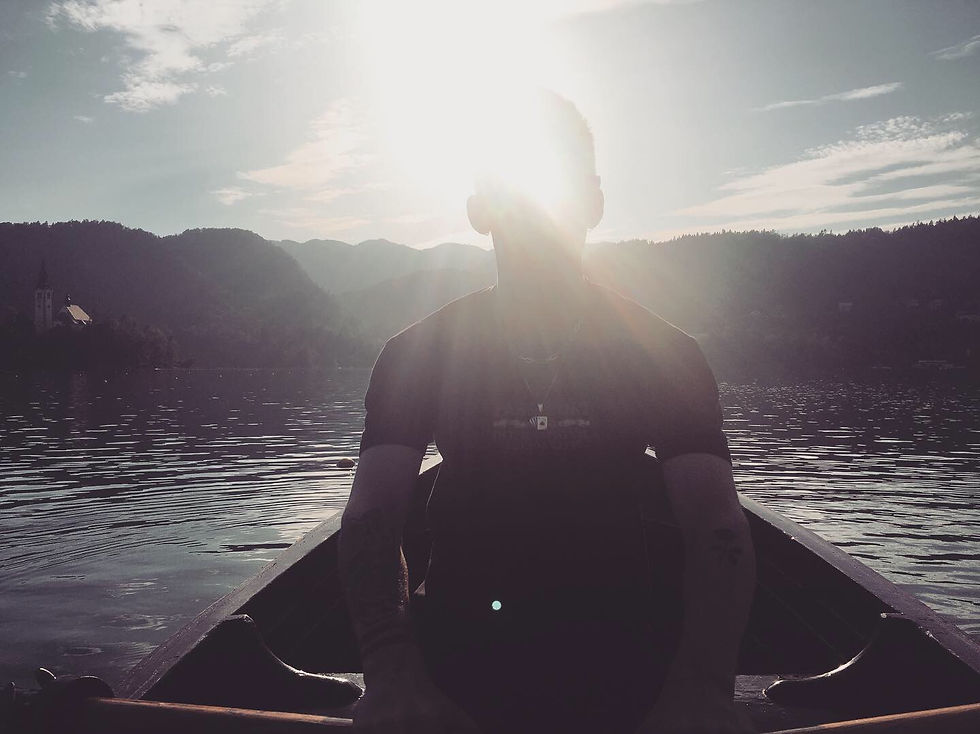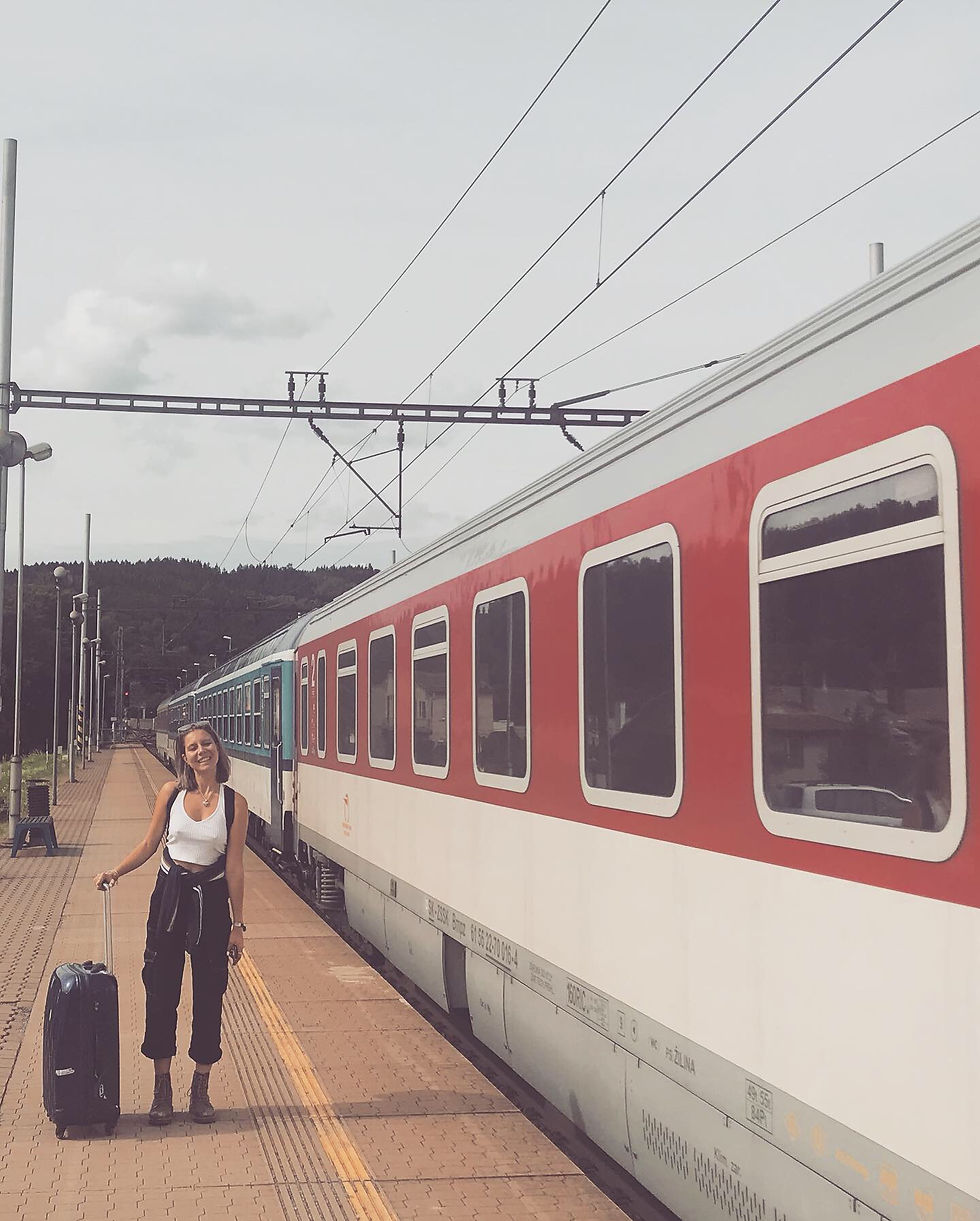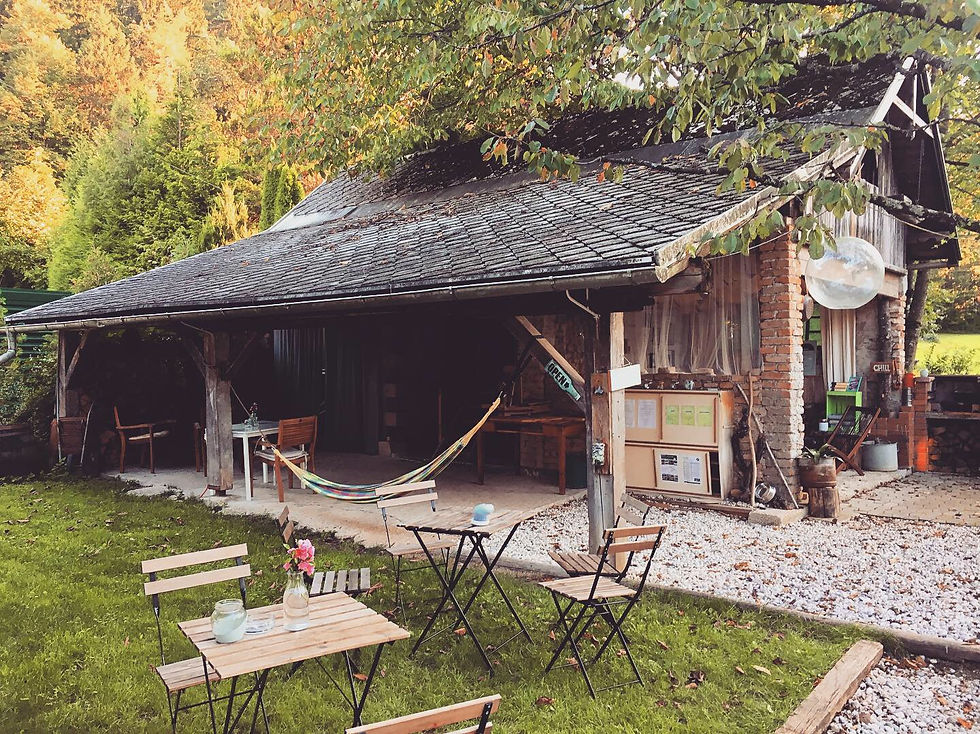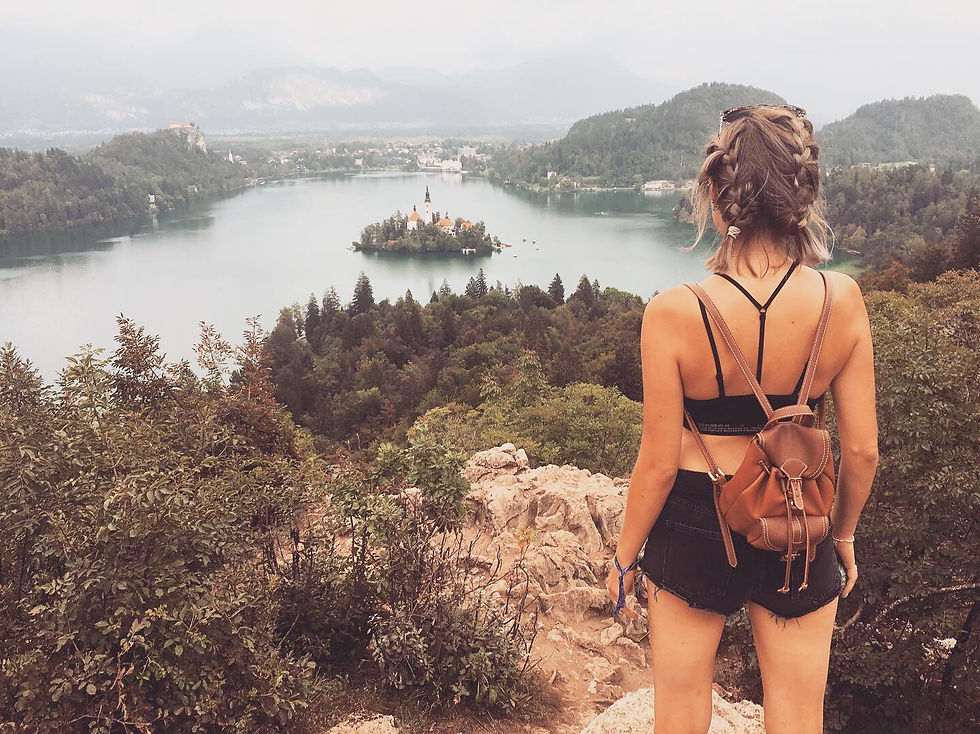So you want to go Inter-Railing?
- Carys Reid-Davies
- Sep 20, 2019
- 9 min read
Updated: Aug 20, 2020
Countless countries, tiring train journeys, crazy currencies (in Hungary £1 is over 350 Hungarian Forint!), contrasting climates, abstract alcohol, foreign foods . . . have you got a headache yet? I wouldn't blame you if you did because I definitely found it stressful at times, but here's a blog with all my top tips on how to master inter-railing round Europe.
Where To Go
We decided to do Eastern Europe but there's so many routes you can do. It's down to the person you are, the countries you like, the time you have, and the budget you've set. There's loads of helpful information on the interrail.eu website, with links such as this one to help you plan your trip:
Our route was:
London St. Pancras to Amsterdam (very slick journey but you need a reservation at extra cost).
Amsterdam to Prague (stopping off in Berlin for a few days would work well, I'd just done Berlin already so we missed it out).
Prague to Wroclaw (this was out in the sticks so we had most changes on this leg).
Wroclaw to Krakow (we funded this separately to the inter-rail pass).
Krakow to Budapest (we did a night train for this journey and it was a great option)!
Budapest to Lake Bled (this was a long journey but only one change and so worth it, you just need a good book or some form of entertainment on these days)!

When To Go
There really is no right or wrong time to travel Europe. It is beautiful in the winter, with Christmas markets serving up mulled wine and, if you're lucky, delicate snow flakes painting the streets. However, in the summer the days are longer so you can get more done and you don't have to take as much (winter will require far more bulky clothing).
End of June, July and August are particularly crowded times as this is the summer holidays so if you can afford to avoid these months do. April, May, early June and September seem to be the best time if you want to catch the sun but avoid hordes of people. October, November, January, February and March will be the least busy but, of course, you do risk turbulent weather. However, whenever you decide to go you'll find great places to hunker down in or bask in the sun so don't overthink it, it's more about the company you have!
Who To Go With
Literally anyone! Including just you. I have a friend who went by herself and loved it. There is a lot to be said for that because it gives you more opportunity to meet friends, you are in complete control of what you do, and you learn how to be entirely independent.
That being said, it could get lonely at times, especially if you go for a whole month. I went with my boyfriend and we did have a wonderful time. We know each other so well that we clocked when one of us needed space and we are so comfortable in each others company. That is very important. Whoever you go with, you must feel comfortable with them. If you're too tired, you should be able to say. If there's one thing you really want to do, you need to be able to tell them. This should be a trip of a lifetime so whoever you're with, you need to click.
Last summer I went out and met my best friend in Budapest as she was inter-railing with two university housemates. The four of us had an absolute ball and it felt like a good number. We could do things in pairs, there was enough of us that it felt like a solid group, but there wasn't too many of us that nothing ever got done. That's something to consider. The bigger the group, the more faffing and waiting around you'll have.
I'd say four is the best number. Whether it's mixed, all boys, all girls, or, alternatively, just you and your partner. They're all great options. But ultimately, it's up to you.

Booking Your Pass
In order to go, you need an inter-rail pass which you can get at:
There are various options, for example a one country pass or a global pass, and on top of that you can choose how many days you want the pass for. We opted for a global pass, as this allows you to go almost anywhere in Europe. In terms of the days, whenever you travel on the train, that counts as 'one day'. You have a 24 hour period from when you first board so you can get any number of trains you want in that day, but once the 24 hours is up, it'll count as a new day. We got a five day pass and just bought an internal train ticket from Wroclaw to Krakow as it was only about £8, so this is a good way of going more places cheaply. In three weeks the 5 day pass was perfect but for a shorter trip a 3 day pass would work and a longer one (a month and over) would likely need 7 days. You can find out the best pass for you by using a tool on the inter-rail site that can be found here:
How It Works
Once you've got your inter-rail pass, you'll have to fill in the departing station, arrival station, and date of travel for each journey. Don't fill this in until the day of travel though (we did ours when we were sat on the first train of the day) in case your train is cancelled or delayed, and you have to leave another day! When you get to the stations there's a barcode on the back of the pass that you can scan to get out of the barriers (we only had to use this in Amsterdam). Whenever a ticket officer comes along, you simply show your pass with the details filled in and they'll stamp the ticket to validate it. Simple as that.

Reservations
It's important to know that even when you've bought your inter-rail pass, that doesn't guarantee you a seat. Whilst the majority of our journeys were fine, you may find yourself being kicked out of carriages without a reservation and some journeys, (such as the London to Amsterdam and overnight train to Budapest) had mandatory reservations. These come at an extra expense so you can end up racking up the costs if you don't check this out. There is an inter-rail app (see link below) you can use to plan you're journey's, though, and you can set a filter for trains that don't require reservations.
Accommodation
So you've got your journey planned, the pass is on its way, but where are you going to stay? Hostels are a great shout. It's a fab way to meet new people and get local tips, plus they're usually fairly cheap. We stayed at two hostels, both of which had a private room for us, and were the best accommodations. The first was in Krakow, T&T Hostel, and the second was in Lake Bled, The Garden House.
T&T Hostel: http://tt-hostel-apartments.krakowhotels.net/en/ (Krakow)
The Garden House: https://www.facebook.com/gardenhousebled/ (Lake Bled)
We actually used airbnb for each place we stayed, but the others were all apartments where we had our own room, except for Amsterdam which was our own floating river house. Airbnb was great, and having recommendations from our hosts was so useful, but hostelworld is another good app to use if you want to book cheap places. When I went to Budapest last year I stayed at the Wombats hostel, which is a chain in quite a few countries so that's another good shout!
Airbnb: https://www.airbnb.co.uk/
Hostelworld: https://www.hostelworld.com
Wombats: https://www.wombats-hostels.com/

Expenses
How much you spend will be determined by a lot of factors. The most influential being, where you go. Amsterdam was the most expensive and I know that Scandinavian countries (Sweden, Copenhagen, Norway, Iceland) are also notoriously costly. However, places like Prague and Budapest are a lot more reasonable, especially in terms of alcohol!
If you're staying in hostels you'll be able to cook meals so that's a great way to save money. However, we ate out for every meal (excluding two breakfasts when we had cereal as we were up early and one dinner which we made in Slovenia) and our costs came to about £750 for three weeks (that's including the costs of a 3 hour zip wire trip, Auschwitz, the Salt Mines and Anne Franks House).
With the inter-rail pass, reservations, and accommodation to take into account, I'd say that for 3 weeks you'd ideally want £1,500 for everything. As I said, you can definitely save in places, however, if you're to make the most of the trip you will want to splash out at times.
What Should You Take
You can spot a traveller from a mile away. With a bag bigger than them strapped onto their back, hiking boots laced up securely, and red faces from the strain of carrying all their belongings, it doesn't come across as the most comfortable. That's why we decided to take suitcases. Now, it may not have the same gritty feel to it as slinging a bag on, but it was a hell of a lot more easier. Having had many pals who'd already inter-railed, I was so grateful for this recommendation which all of them collectively agreed was far better.
So tip number one: take a suitcase (it's also cheaper than splashing out on a 65 litre rucksack because if you don't already own one, it'll be a nasty shock for your bank account).
I found I wore my docs the most when exploring each city. They were comfortable and sturdy so some kind of boot is an essential. I also took some trainers which I did wear occasionally but I could have practically done the whole three weeks just in docs.
Tip number two: have a good, solid pair of shoes (ideally boots).
As for clothes, take a variety. Obviously you'll need to look up the weather for each specific place you're going to so you have a rough idea, but weather is unpredictable. As we went in September, I was expecting we'd be greeted with chillier weather and rain, but the majority of the trip was enjoyed in temperatures between 25 and 30 degrees. I was thankful I had taken a raincoat as that one night we went out to the Krakow markets there was a fair share of rain. However, I could have easily got by without. The main thing is you don't want to end up freezing cold (and nights can be cool) but you don't want to be sweaty in the humidity of so many European cities either.
Tip number three: choose diverse attire.
You'll be doing some long journeys and spending a lot of concentrated time with one person or a group of people. Make sure you have plenty of entertainment, some that all of you can participate in and others just for you. We each had a book to read, and I also wrote a lot of my blog whilst travelling. However, we played hundreds of cards and had other fun games such as Scattegories and a portable monopoly. We also spent a few evenings watching a film as you will get very tired and need to unwind sometimes.
Tip number four: be sure to have various forms of entertainment.
It's also worth taking a travel towel as some hostels don't provide them or charge you. We were fine but you'd rather be safe than sorry! As well as that, I took some washing up tablets so we could wash our clothes in apartments with a washing machine, or, if needs be, burst one in a sink and do a DIY wash!
Tip number five: think about how you'll wash your clothes.
Think about where you're going and what you want to get out of the trip. A lot of cities have wonderful activities, sights, parks, galleries and museums on offer. Most you can book whilst there, but some need to be done in advance. I went to Amsterdam two years ago and we couldn't get into Ann Frank's house so this time round I booked it well in advance. We also knew we wanted to go to Auschwitz so that was something else we pre-booked. With any tickets like this, along with reservations, your inter-rail pass, and your passport, you need to have a good system. I'd suggest a travel pouch with all the details of your trains and accommodation in there too. Organisation really is important when embarking on this kind of trip.
Tip number six: research where you're going, think about what you want to do, and have everything important secure in one safe place.
So that's it, where to go, when to go, who to go with, how to go, where to stay and what to take. You may feel like you need a strong drink after reading all that (I definitely feel like one after writing it all)! But the best advice I can give is just GO. If you're on the fence, even if you're no where near the fence, hop on and over because you won't regret it.
My dad once gave me advice that I'll never forget: you'll very rarely regret the things you did, just the things you didn't do.






Comments